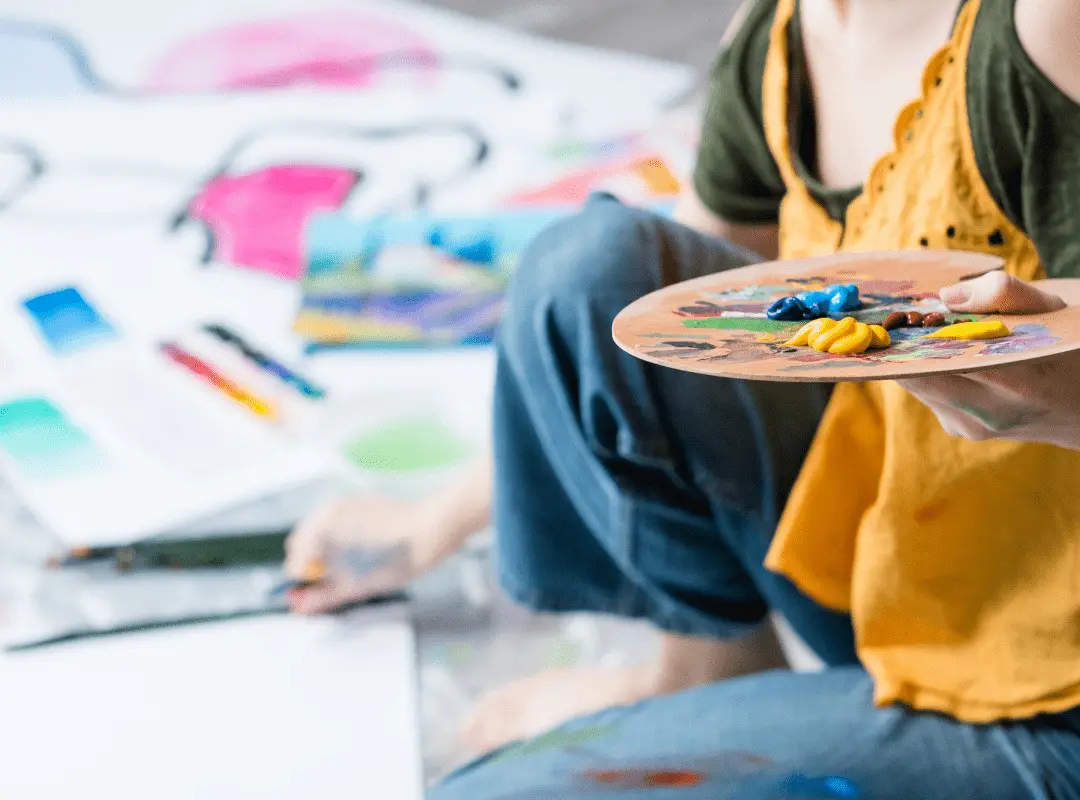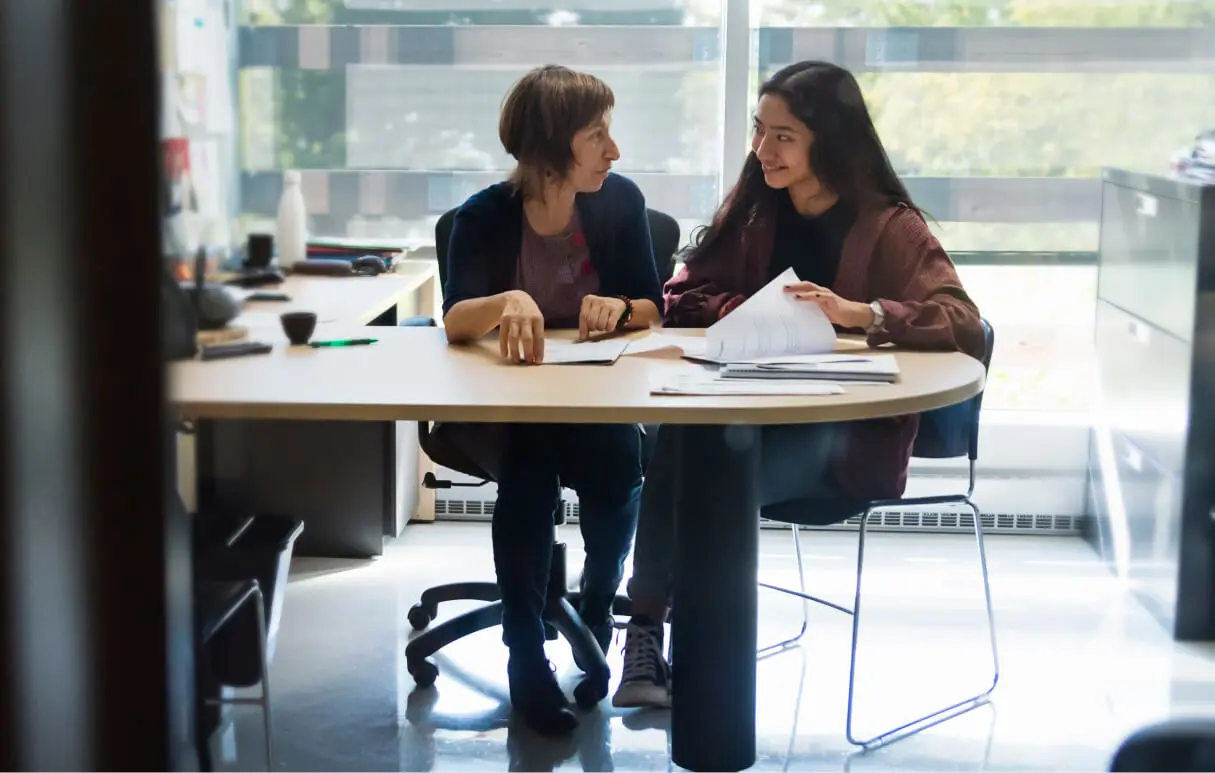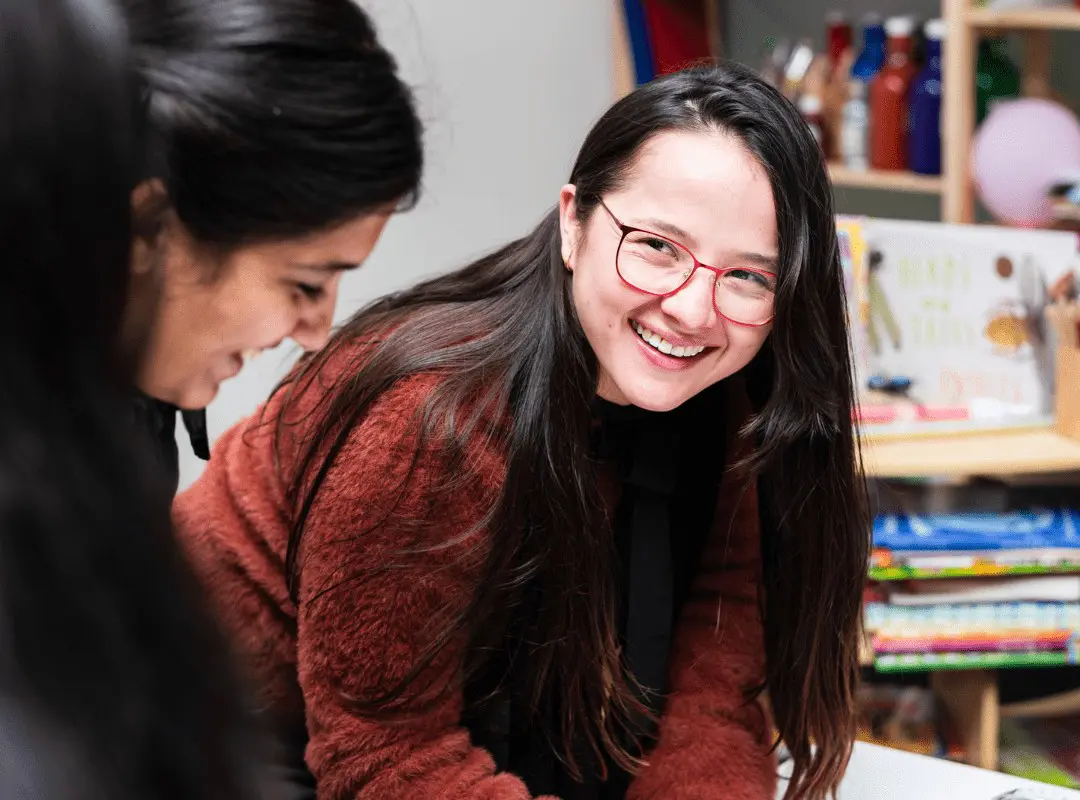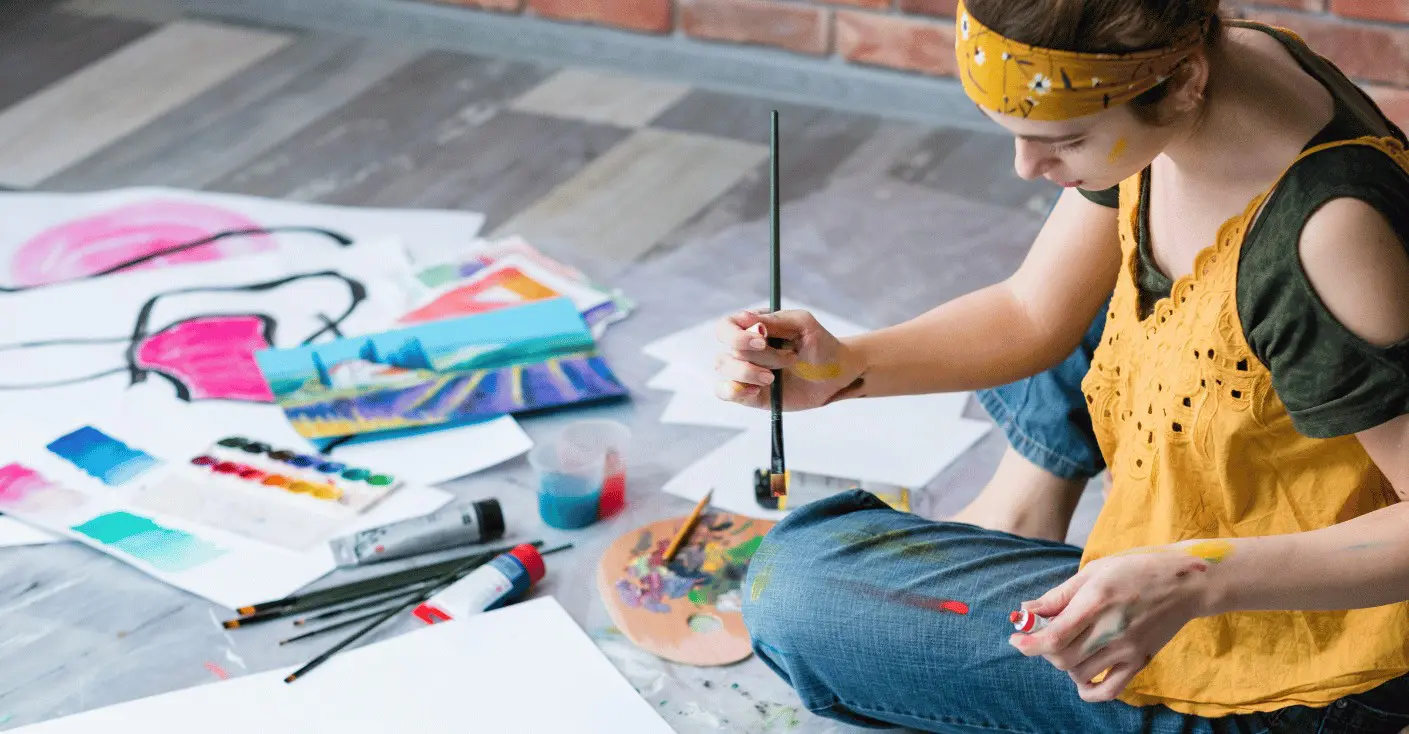Course Overview
Art therapy is a unique healing approach that benefits a wide range of clients, including children, adolescents, trauma survivors, individuals with disabilities, and those from diverse cultural backgrounds. It is particularly helpful for those who may find it challenging to engage in more traditional talking therapies. In our Diploma of Arts Therapy course, you will learn how art making and symbolic communication have an important role in facilitating healing outcomes.
You will explore how self-expression through creative activities can improve physical, emotional, cognitive, and social integration and functioning. The insights and personal understanding you will gain from this process can be instrumental in promoting change. Additionally, the course will introduce you to various arts therapy theoretical perspectives and concepts, helping you to develop relational skills and a therapeutic presence to guide clients in expressing their inner experiences through the creative arts.
Through this course, you will develop relational skills and therapeutic presence to help clients explore their inner experience through the creative arts and the art-making process.
This qualification is FEE-HELP approved for eligible applicants.
Key Information
| Award | Diploma of Arts Therapy |
| Duration | 1 Year Full Time (or Part Time Equivalent) |
| Study Mode | On Campus Online* |
| Locations | Melbourne Sydney Online |
| Intakes | February, May, September |
| Course Fees | Domestic (FEE-HELP available) |
This course is exclusively available to domestic students commencing in 2026.
Trimester 2, 2026 Applications Now Open
Career Opportunities
This course prepares graduates with the skills to attend to the needs of clients in a variety of arts-based settings. Whether it’s mental health organisations, alcohol and drug centres, or other health centre agencies, you’ll be well prepared to make a significant difference.

Course Structure
You must successfully complete the following 8 subjects, totalling 48 credit points, to complete the Diploma of Arts Therapy. Each subject is specifically designed to provide you with the essential skills and understanding to excel in the field of arts therapy.
If you plan to study full time, a full-time load is typically 8 subjects per year. For part-time students, you will typically complete 4 subjects per year. Please note that our academic year is structured into three trimesters, each consisting of 11 weeks of teaching followed by an exam week.
Delivery & Workload
We’ve created a diverse and engaging learning environment for this course. Your study will involve a mix of lectures, tutorials, arts workshops, group discussions, and self-directed study. For each subject, allocate about three hours for lectures and tutorials. Additionally, you should allow approximately 10 hours per week per subject for self-directed study to complete prescribed readings, practice skills, conduct research, and complete assessments at your own pace.
Subjects
Year 1
This subject, the first in a developmental sequence of study, sets the foundation for your knowledge and skills in counselling and integrative arts therapy practice. You will be introduced to a comprehensive theoretical framework for your practice encompassing person-centred and experiential psychotherapy, Eastern and Indigenous practices and psychodynamic interpersonal therapy originating in the work of Carl Rogers, Eugene Gendlin and significant humanistic-existential and psychodynamic theorists and practitioners.
Key concepts within this framework, such as the actualising tendency, the significance of developing ‘therapeutic relational depth,’ and the differentiation between the ‘real’ self and the externally constructed ‘false’ self, are examined. Additionally, you’ll explore ‘Dadirri’ deep listening, therapeutic presence, and engagement as foundational elements for your work, while also exploring the differences between the therapeutic relationship with ‘relational depth’ and the ‘therapeutic alliance.’ The ultimate objective is to enable you to integrate experiential relational theory into your practice.
Subject Code: SOC101
Credit Points: 6
Co-Requisite: ART102 Integrative Arts Therapy in Practice
In the second subject in our developmental sequence of studying arts psychotherapy practice, you will have the opportunity to apply theory into practice. Through one-to-one therapeutic interactions with peers, you will share and collaborate on your own ‘lived experience’ in sessions. Using interventions and processes, you will build and strengthen therapeutic relationships and assist clients in exploring inner experiences.
You will be presented with situations that require the use of both foundation and intermediate counselling skills. You will also observe and reflect on the process of counselling within art therapy practice interactions. As part of the subject, you are also guided to reflect on how you apply micro-skills in integrative arts therapy within your practice.
Subject Code: ART102
Credit Points: 6
Co-Requisite: SOC101 Integrative Psychotherapy in Theory
This experiential subject focuses on the theory and art making practice of art therapy methodologies. You will examine the historical and philosophical foundations that have shaped art therapy as a distinct discipline. You will study the four methods of working therapeutically using art making as a process of self-awareness, change, healing, and transformation. These models include the expressive therapies continuum (ETC), person-centred (Rogerian) art therapy, analytical (Jungian) art therapy and mindfulness art therapy. Each model will be thoroughly explored, providing insight into its origins, terminology, and practical application through art making as a tool for change.
Engaging in experiential exercises each week will allow you to integrate the theory within each specific model and you will understand how art-making can be used therapeutically. You will also learn to use art-making as a form of communication and as a pathway to the subconscious. Additionally, you will have the opportunity to fully appreciate the ‘power’ of various art materials, learn how to guide the art-making process therapeutically, and understand when to introduce visual exercises and when to select or avoid certain media.
Subject Code: ART103
Credit Points: 6
This subject invites you to explore the lived experience of the art-maker using a wide variety of art media. Through interactive lectures and experiential learning, you will experiment with a variety of 2D and 3D art materials, discovering how their unique qualities can create physical and emotional responses in the artist.
You will work with both traditional and non-traditional art materials, including ready-made imagery, found objects, natural objects and the human body. Your artistic journey will involve creating art in response to external sensations and internal experiences, as well as creating public art and collaboration in constructing an art installation. You will also use the expressive therapies continuum to understand how artwork emerges from your own art-making process.
Subject Code: ART104
Credit Points: 6
This subject provides a comprehensive overview of mental health practice and the role of arts therapists in promoting mental health and wellbeing in clinical and community mental health settings.
You will explore the evolution of mental health concepts over time. The introduction of the DSM 5 will allow you to recognize important terms and significant categories within this manual, while also evaluating its strengths and limitations. Using the DSM 5, you will gain an understanding of mental health diagnosis and symptomology alongside personal accounts detailing real-life mental health challenges. This approach aims to provide insight into the lived experience of DSM 5 diagnosis and guide you to identify some of the limitations of the classification system in the real world. Additionally, phenomenological arts-based inquiries will extend your understanding of media and modality choices with such presentations. Case studies will also be used for class discussions and group activities and you will be introduced to the dynamic role of arts therapists in addressing clinically diagnosed presentations within a recovery model framework. The subject will also explore arts therapy practice within mental health facilities and community settings.
Subject Code: ART105
Credit Points: 6
In this subject, you’ll explore the ethical foundations of individual worldviews which can unconsciously shape prejudices and biases. You will gain the knowledge, skills and awareness required to engage in ethical and culturally mindful therapeutic practices. Through a curriculum focused on culture and diversity, independence, autonomy and philosophy, you will examine the versatility of embedded identities and their influence on beliefs, values and biases, both positive and negative. Awareness of stereotyping, privilege, poverty, racism, ageism, misogyny, homophobia and other forms of oppression will prepare you for addressing the worldviews and challenges of specific client groups.
Additionally, you will explore how minority stress can contribute to trauma, shame, interpersonal difficulties, self-criticism, lack of personal agency, anxiety and depression and how these experiences may influence the therapeutic relationship. You will also develop cross-cultural skills essential for working with diverse populations such as Aboriginal and Torres Strait Islander individuals, families and communities, learning how to approach their therapeutic needs and healing.
Ultimately the subject aims to foster an understanding that ethical behaviour and cultural competence extend beyond having an awareness of individual and cultural differences, embracing a commitment to eliminate unconscious bias and discrimination in therapeutic practice.
Subject Code: SOC106
Credit Points: 6
This subject is designed to develop your understanding of ethical and legal issues critical to arts therapy practice. You will learn about ethical principles and frameworks guiding behaviour and decision-making, including relevant legislation, professional practice standards and codes of ethics within the Australian professional landscape. By analysing real-world scenarios, you’ll learn to identify ethical and legal issues and propose solutions to dilemmas common in therapeutic practice, including those relating to professional responsibilities, professional boundaries, dual relationships, artworks, and e-art therapy. You will also explore how your personal values may influence your behaviour, decision-making and the development of your professional identity. Ultimately, this subject integrates personal art practice, philosophy, and art therapy in a practical and comprehensive manner.
Subject Code: ART107
Credit Points: 6
This subject combines theory and group work participation to fully understand Group Art Therapy, covering the historical and philosophical foundations of group work, particularly in art therapy group work. You will learn about the fundamentals of group work including planning, set up, beginnings/endings, creative methods, managing group participants, key concepts, themes, patterns of behaviour, and facilitating group work.
Through experiential learning, you will facilitate a one-hour art therapy group, gaining valuable experience as an art therapist within a safe learning environment. This practical component is part of the subject’s assessment requirements. Weekly group art therapy sessions provide you with a chance to apply theory to practice, create art in a group setting, and witness the transformative potential of art therapy. Additionally, you will explore various art materials, and learn therapeutic art-making processes and visual exercises
Subject Code: ART108
Credit Points: 6
Co-Requisite: SOC101 Integrative Psychotherapy in Theory, ART102 Integrative Arts Psychotherapy in Practice

Recognition of Prior Learning
At Ikon, your past studies or work experience can be acknowledged through Recognition of Prior Learning (RPL) or Credit Transfer. RPL evaluates your previous skills and experience against the learning outcomes of Ikon subjects, potentially exempting you from studying certain subjects. Credit Transfer allows your previous studies to contribute towards your qualification, granting credits based on matched content and learning outcomes between equivalent qualifications. These pathways could help you to fast track your qualification, reducing study time and tuition fees.
Credit Pathway
Our Diploma of Arts Therapy graduates can advance directly into the second year of our Bachelor of Arts Therapy. Eligible applicants will be guaranteed 48 credit points out of a total of 144 points for our Bachelor of Arts Therapy.
Entry Requirements
Domestic Students
Our entry pathways include:
- Recent Senior Secondary Education: This applies to those who have completed an Australian Senior Secondary Certificate (Year 12) or its equivalent within the past two years. For guaranteed entry, an ATAR of 65 is required.
- Applicants with Higher Education (HE) study: This requires successful completion (or partial completion) of a higher education qualification.
- Vocational Education and Training (VET) study: This requires completion of a vocational qualification at Diploma level or higher.
- Work/Life experience: If you have left senior secondary education more than two years prior to your application and have not undertaken VET or higher education study since then, you may be eligible based on your professional or work experience and/or any non-formal courses taken in preparation for tertiary study or relevant to the subject area. You must also submit a written admission statement outlining your reasons for pursuing the Diploma of Arts Therapy. For more information about writing your admissions statement, click here.
All applicants must complete the Learner Questionnaire found in the Application Form, demonstrating their inherent qualities and motivations to succeed in the course. You may also be asked to participate in an informal interview with an Ikon representative.
To discuss the most suitable pathway for your circumstances, please contact us at 1300 613 801 Domestic: Ext 1, or email us on [email protected].
For more information, please refer to the following:
Application Process
Student Admission Policy
Inherent Requirements
Student Profile
Find Out More!
Complete the form below to download our course brochure and find out more about the Diploma of Arts Therapy.

